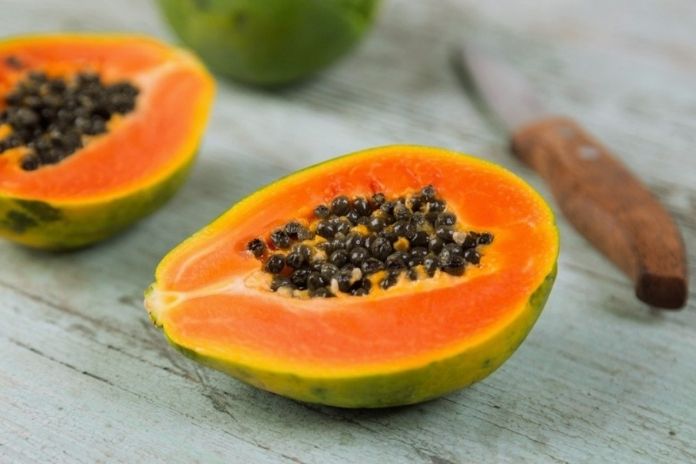Originally from Mexico, but which grows and is cultivated in all tropical environments, with a characteristic juicy and refreshing flavor, Papaya is a fruit known and now appreciated worldwide. Not only for its versatility in the kitchen: it can be eaten both fresh and cooked, used to prepare sweets and savory recipes, to flavor pork or chicken, as a basic ingredient to prepare preserves or jams or give, for fermentation, a kind of brandy.
It is, above all, a product with a very interesting nutritional profile. One hundred grams of Papaya produces only 28 kcal, of which 91% are carbohydrates, 3% fat and 6% protein. The fruit is rich in water (89 g out of 100). It contains a good amount of fiber (2.3 g), making it a friendly product for intestinal transit, with unique properties for regulating digestion.
Properties And Benefits Of Papaya
Let’s start by saying that Papaya is rich in an enzyme, papain, which is very useful for improving digestion. It is, in fact, particularly indicated in the case of constipation and hypertension. Papain also can establish acid-base balance in the body, causing it to turn towards alkalinity.
Hyperacidity is the first factor of cell damage, often prompted by an incorrect lifestyle (smoking, unbalanced diet) and other negative factors (stress, pollution).
Papaya is also a mine of antioxidants: selenium, flavonoids, carotene, provitamin A which the body transforms into vitamin A. Its main carotenoids are lycopene and beta-cryptoxanthin, which, together with other oxidants, protect cells from free radicals, limiting ageing.
Among other things, flavonoids support the permeability of blood vessels, so they are important for microcirculation and brain circulation.
Papaya is also rich in vitamins and minerals: vitamin C, vitamin A, potassium, zinc and magnesium, which help fight fatigue and remineralizer the body, giving energy and limiting psycho-physical stress. It is no coincidence that Papaya is also called the “fruit of vitality”. As we all know, vitamin C also strengthens the immune system, preventing seasonal ailments such as flu and colds. Thanks to antioxidants and fibers, which lower the levels of bad cholesterol (LDL) in the blood, and potassium, which instead controls blood pressure, it can be said that Papaya is also a good ally of the heart.
Finally, this fruit can be considered a bit like a scavenger: both because it “remedies” the damage of an unbalanced diet low in fresh fruit and vegetables, purifying the body; and favoring the body’s waste substances, purifying the blood. It stimulates the kidneys, helps to reduce the overdose by reactivating the metabolism.
It is, therefore, a very important fruit that should be consumed frequently. If it is not possible to eat it fresh, a good solution could be to resort to specific supplements. On farmers. Suppose you will find Papaya Pura: a food supplement useful against ageing. It helps to strengthen the immune system. Papaya Pura is ideal for sublingual consumption, this area of the body being the one with the highest absorption capacity.
Nutrition
One hundred grams of fresh Papaya weighs just 39 calories. Rich in vitamins A, B, C (more than kiwis and carrots!) And P also has a high content of water (88%), fiber and antioxidants. Low in fat (0.3 g per 100 g of product). And protein (0.5 g) boasts an absolute zero in terms of cholesterol!
Seeds
Papaya seeds have attracted attention as a potentially healthful food. Although there is no definite evidence to support this thesis, the sources are non-toxic and would not hurt. What is certain is that they taste great when dried and ground as a substitute for black pepper. Speaking of seeds .There is also a variety of Papaya that does not have them: “Aurora”. It is native to Hawaii and was developed in Israel through hybridization methods without genetic manipulation.
ALSO READ: SEVEN REASONS TO EAT MORE POTATOES

